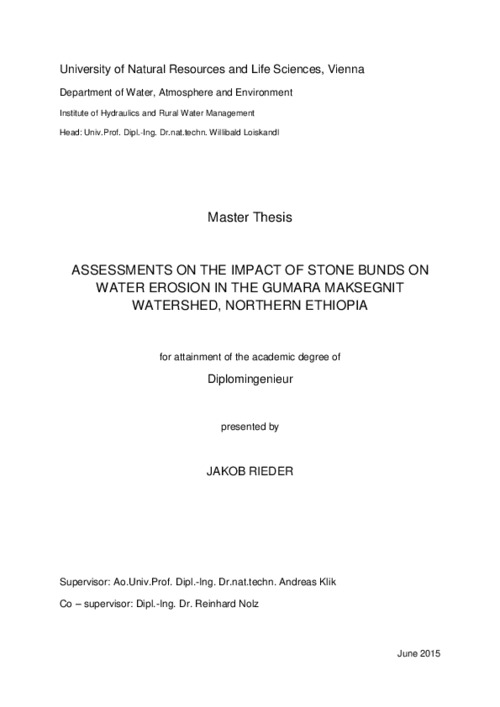Assessments on the impact of stone bunds on water erosion in the Gumara-Maksegnit watershed, Northern Ethiopia
Abstract
Soil erosion due to heavy rain events during the rainy season from June to September is a 
big threat to the Ethiopian highlands. About 85 % of the total population of Ethiopia, live from 
agriculture and therefore sound soils are crucial for the country´s nutrition supply and they 
act as a backbone for development and progress. In order to reduce water erosion on sloped 
acres in the experimental site, embankments of stones were built along the contour lines 
during the last years. These stone bunds reduce downslope surface runoff and therefore also 
soil erosion decreases. This thesis assesses the effectiveness of stone bunds as a soil 
conservation measurement. The project was carried out from the middle of June until the 
beginning of September in 2013 in the Gumara – Maksegnit watershed, with an area of 54 
km², in the Amhara region in Northern Ethiopia. At the beginning of the field work two erosion 
plots, each with an area of 60 m², were installed in the field next to each other. The only 
difference between both plots was, that one plot had a stone bund on its´ slope toe and the 
other on was without a stone bund. Slope, soil texture, rock fragment cover and canopy 
cover were equal on both plots. Samples were taken of the surface runoff of both plots and 
through laboratory analysis, soil erosion rates of both plots could be determined and 
compared with each other. Also the influence of the maintenance of a stone bund on soil 
erosion was assessed. Additionally other important parameters, which influence soil erosion, 
like slope, canopy cover, and rock fragment cover were determined

